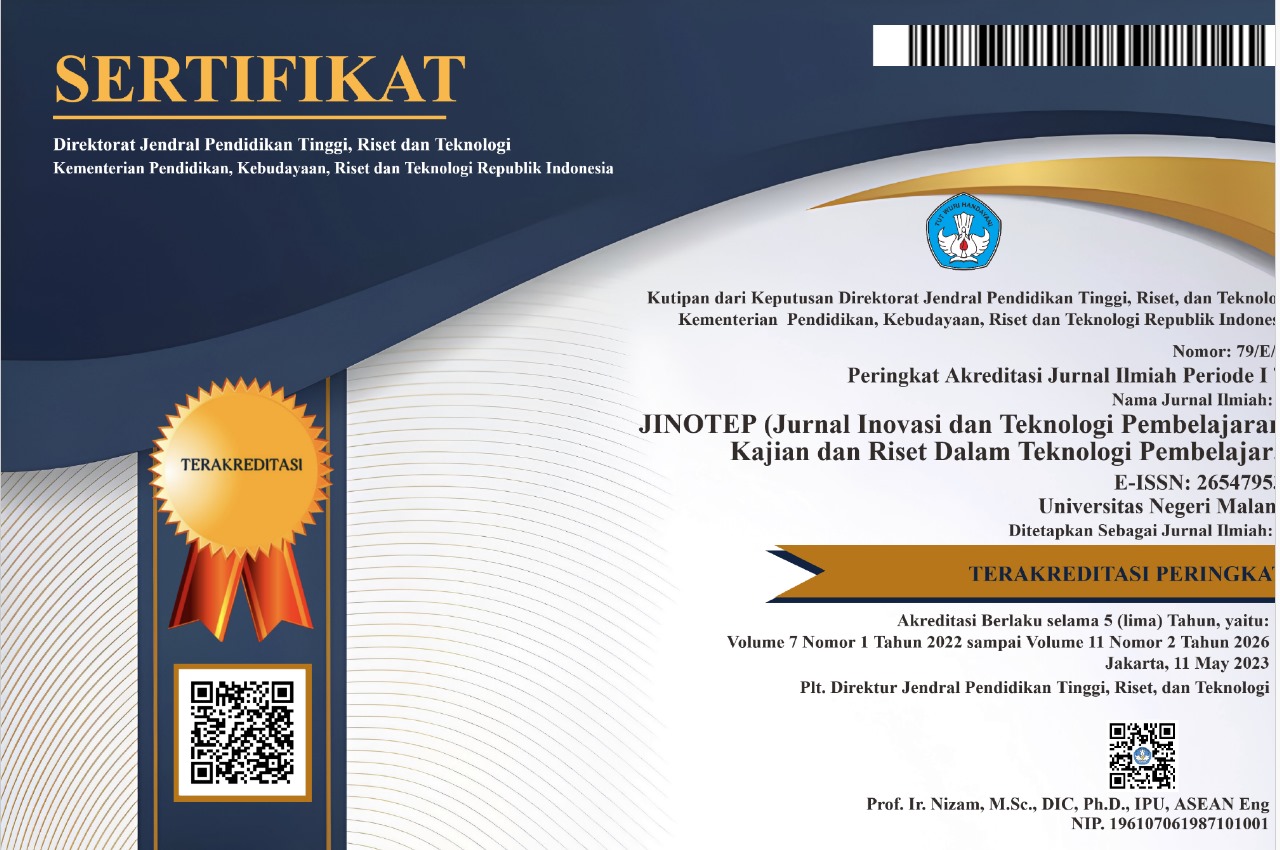Developing Authentic Assessment Rubric for Assessing English Skill Of Grade 4: A Case Study in Buleleng
Abstract
Abstrak: Tujuan penelitian ini untuk mengembangkan rubrik penilaian otentik kelas 4 berdasarkan sintaksis pembelajaran discovery, berbasis proyek, masalah dan berbasis tugas. Metode desain dan pengembangan digunakan dengan model ADDE. Subjek penelitian ini adalah guru bahasa Inggris dan siswa kelas 4 di dua sekolah di Buleleng. Wawancara, observasi, dan studi dokumen merupakan metode pengumpulan data. Hasil dari tahap analisis digunakan untuk merancang dan mengembangkan rubrik penilaian otentik. Ini dikembangkan berdasarkan silabus kelas 4. Rubrik didukung dengan sumber belajar mengajar, tabel perbandingan dan analisis. Ada empat jenis rubrik yang dikembangkan, yaitu rubrik untuk menilai proses dan hasil belajar siswa, rubrik penilaian diri terhadap proses dan produk atau kinerja belajar siswa. Berdasarkan hasil penilaian ahli rubrik yang dikembangkan layak digunakan untuk siswa kelas empat.
Abstract: The purpose of this study is to develop an authentic assessment rubric for grade 4 based on the syntax of discovery learning, project based-learning, problem-based learning, and task-based learning. The design and development method was used with the ADDE model. The subjects of this study were English teachers and students of grade 4 in two schools in Buleleng. Interview, observation, and document study were the methods of data collection. Next, the result of the analysis phase was used to design and develop the authentic assessment rubric. It developed based on the grade 4 syllabus. The rubric supported with teaching and learning resources, a comparison and analysis table. There are four types of rubrics developed, rubric for assessing the process and students' learning performance or product, self-assessment on the process and on students' learning product or performance. Based on the result of evaluation phase the rubric was appropriate for students in fourth grade.
Keywords
Full Text:
PDFReferences
Abduh, M. Y. M. (2021). Full-Time Online Assessment during COVID -19 Lockdown: EFL Teachers’ Perceptions. Asian EFL Journal, 28(1), 26–46.
Albahlal, F. S. (2019). The Integration of 21th Century Skills into English Language Learning. Journal of Applied Linguistics and Language Research, 6(3), 144–154.
Anagün, Ş. S. (2018). Teachers’ Perceptions about the Relationship between 21st Century Skills and Managing Constructivist Learning Environments. International Journal of Instruction, 11(4), 825–840. https://doi.org/10.12973/iji.2018.11452a
Anderson, M. (2010). Knowing Fourth Graders. In What Every 4th Grade Teacher Needs to Know About Setting Up and Running a Classroom. Northeast Foundation for Children. www.responsiveclassroom.org.
Ashraf, H., Ahmadi, F., & Hosseinnia, M. (2017). Integrating 21st Century Skills Into Teaching English: Investigating Its Effect on Listening and Speaking Skills. I-Manager’s Journal on English Language Teaching, 7(4), 35–43. https://doi.org/10.26634/jelt.7.4.13766
Benešová, A., & Tupa, J. (2017). Requirements for Education and Qualification of People in Industry 4.0. Procedia Manufacturing, 11(1), 2195–2202. https://doi.org/10.1016/j.promfg.2017.07.366
Bhuana, G. P., & Apriliyanti, D. L. (2020). Teachers’ Encounter of Online Learning: Challenges and Support System. Journal of English and Teaching (JEET), 5(1), 110–122. https://doi.org/10.33369/jeet.5.1.110-122
Celik, B. (2017). Task-Based Learning: An Effective Way of Developing Communication Skills. International Journal of Social Sciences & Educational Studies, 4(2), 104–108. https://doi.org/10.23918/ijsses.v4i2sip104
Chowdhury, F. (2019). Application of Rubrics in the Classroom: A Vital Tool for Improvement in Assessment, Feedback and Learning. International Education Studies, 12(1), 61. https://doi.org/10.5539/ies.v12n1p61
Dharma, I. P. S., & Adiwijaya, P. A. (2019). The Analysis on the Readiness of English Teachers in Implementing Authentic Assessment in Senior High Schools. Lingua Scientia, 26(1), 48–52. https://doi.org/10.23887/ls.v26i1.19163
Dooly, M., & Dowd, R. O. (2018). In This Together: Teachers’ Experiences with Transnational,Telecollaborative Language Learning Projects (M. Dooly & R. O’Dowd (eds.)). Peter Lang.
Fahmi, Setiadi, I., Elmawati, D., & Sunardi. (2019). Discovery Learning Method for Training Critical Thinking Skills of Students. European Journal of Education Studies, 6(3), 342–351. https://doi.org/10.5281/zenodo.3345924
Fitriani. (2017). Implementing Authentic Assessment of Curricullum 2013: Teacher’s Problems and Solusions. Getsempena English Education Journal (GEEJ), 4(2), 164–171. https://doi.org/10.46244/geej.v4i2.749
Hadi, M. S., & Izzah, L. (2018). Problem Based Learning (PBL) in Teaching English for Students of Primary School Teacher Education Department. English Language in Focus (ELIF), 1(1), 45. https://doi.org/10.24853/elif.1.1.45-54
Hairuddin, N. H., Machmoed, H. A., & Jubhari, R. R. (2018). The Use of Problem Based Learning ( Pbl ) Method. Cope of English LanguageTeaching, Literature and Linguistics, 1(1), 1–9.
Haryati, A. S. (2017). The Implementation of 21st-Century Learning to Improve High Level Thinking Skills through Various Model. International Confrence on Education, 1(1), 1–12.
Hussin, A. A. (2018). Education 4.0 Made Simple: Ideas For Teaching. International Journal of Education and Literacy Studies, 6(3), 92–98. http://dx.doi.org/10.7575/aiac.ijels.v.6n.3p.92
Inggriyani, F. (2018). Soft Skills for 21st Century Teacher. ICE (Internasional Conference on Education) FKIP Unpas, 1(1), 143–147.
Joshi, A., Virk, A., Saiyad, S., Mahajan, R., & Singh, T. (2020). Online Assessment: Concept and Applications. Journal of Research in Medical Education & Ethics, 10(2), 79–89. https://doi.org/10.5958/2231-6728.2020.00015.3
Karyawati, A., Ashadi, A., & Salatiga, K. (2018). Innovation in the Classroom : Engaging English as a Foreign Learning Students Using Project-Based Learning. LingTera, 5(1), 61–67. https://doi.org/10.21831/lt.v5i1.17067
Mardiana, R., Ramdini, D. S. ayu, & Putri, F. D. (2021). Developing Online Assessment for Junior High School St Hool Students Using Proprofs During the Covid19 Pandemic. FASCHI: Jurnal Kajian Pendidikan Dan Sosial Kemasyarakatan, 11(1), 1–11. https://doi.org/10.54626/fascho.v11i1.77
Marhaeni, A. A. I. N., & Kusuma, I. P. I. (2017). Analisis Implementasi Asesmen Autentik pada Pembelajaran Bahasa Inggris dalam Implementasi Kurikulum 2013 di SMA di Bali. Seminar Nasional Riset Inovatif 2017, 5, 555–561.
Nurkancana, W., & Sunartana. (1992). Evaluasi Hasil Belajar. Usaha Nasional.
Rapaport, W. J. (2009). A Triage Theory of Grading: the Good, the Bad, and the Middling. Teaching Philosophy, 34, 1–24. https://doi.org/10.5840/teachphil201134447
Richey, Rita C., and James D. Klein. 2005. “Developmental Research Methods: Creating Knowledge from Instructional Design and Development Practice.” Journal of Computing in Higher Education 16(2):23–38. https://doi.org/10.1007/BF02961473
Riestyananda, A., Rahmanto, A. N., & Ninghardjanti, P. (2018). Implementasi Model Penilaian Autentik dalam Pembelajaran di SMK Negeri 1 Surakarta Tahun Ajaran 2017/2018. Jurnal Informasi Dan Komunikasi Administrasi Perkantoran, 2(5), 91–100.
Rosdiana, M., Sumarni, S., Siswanto, B., & Waluyo. (2020). Implementation of 21st Century Learning Through Lesson Study. Advances in Social Science, Education and Humanities Research, 421(1), 346–353. https://doi.org/10.2991/assehr.k.200323.041
Saputra, E. R., Hamied, F. A., & Suherdi, D. (2019). A Case of Authentic Assessment in Indonesian Secondary EFL Classroom Context: Teachers’ struggle. Advances in Social Science, Education and Humanities Research, 254(1), 198–201. https://doi.org/10.2991/conaplin-18.2019.40
Sobari, M. R., & Husnussalam, H. (2019). The Use of Discovery Learning Method to Improve Students’ Writing Descriptive Text. PROJECT (Professional Journal of English Education), 2(2), 133–139. http://dx.doi.org/10.22460/project.v2i2.p234-240
Soliha, I. A. (2019). Speaking Assessment Based on The 2013 Curriculum from English Teachers and Their Perception. Proceedings of MELTC (Muhammadiyah English Language Teaching Conference), 53–70.
Sukmawati, N. N. (2018). Teacher Talk in Teaching English for Young Learners. Jurnal Varia Pendidikan, 30(1), 62–72. https://doi.org/10.23917/varidika.v30i1.6545
Surahman, E., Wang, T. H., Thaariq, Z. Z. A., Sugiarti, D., Pratama, U. N., & Aisyah, E. N. (2021). High School Teacher’s Perception toward Online Assessment in Blended Learning. Proceedings - 2021 7th International Conference on Education and Technology, ICET 2021, 230–234. https://doi.org/10.1109/ICET53279.2021.9575099
Surya, S. (2017). Teaching Inovation by Using Task-based Learning. CaLLS, 3(1), 39–58. http://dx.doi.org/10.30872/calls.v3i1.816
Suwartono, T., & Riyani, C. (2019). Authentic Assessment in Elt: Hopes, Challenges, and Practices. Refleksi Edukatika : Jurnal Ilmiah Kependidikan, 9(2), 112–120. https://doi.org/10.24176/re.v9i2.2865
Syahidah, U., & Umasugi, F. (2021). A Design of Speaking Assessment Rubric. Exposure: Journal Pendidikan Bahasa Inggris, 10(1), 31–46.
Tanyer, S., & Susoy, Z. (2018). Assessment of young language learners: Perceptions and practices of Turkish EFL pre-service and in-service teachers. The Journal of Language Learning and Teaching, 8(2), 127-149.
Thuan, P. D. (2018). Project-Based Learning: From Theory to EFL Classroom Practice. Proceedings of the 6th International OpenTESOL Conference, February, 327–339.
Ulya, H., Rahayu, R., & Riyono, A. (2019). Integration of Products Assessment in Mind Mapping Learning to Enhance Mathematical Communication. Journal of Physics: Conference Series, 1175, 1–8. https://doi.org/10.1088/1742-6596/1175/1/012142
Upa, R., Sudirman, A. M., & Suardi. (2018). Self Assessment in the Teaching of Argumentative Writing. Prosiding Seminar Nasional, 04(1), 327–333.
Vasileiadou, D., & Karadimitriou, K. (2021). Examining the Impact of Self-Assessment with the Use of Rubrics on Primary School Students’ Performance. International Journal of Educational Research Open, 2(2), 1–9. https://doi.org/10.1016/j.ijedro.2021.100031
Wangid, M. N., Mustadi, A., Senen, A., & Herianingtyas, N. L. R. (2017). The Evaluation of Authentic Assessment Implementation of Curriculum 2013 in Elementary School. Jurnal Penelitian Dan Evaluasi Pendidikan, 21(1), 104–115. https://doi.org/10.21831/pep.v21i1.15779
Yulianto, D., & Mujtahid, N. M. (2021). Online Assessment during Covid-19 Pandemic : EFL Teachers ’ Perspectives and Their Practices. Journal of English Teaching, 7(2), 229–242. https://doi.org/10.33541/jet.v7i2.2770
DOI: http://dx.doi.org/10.17977/um031v9i12022p099
Refbacks
- There are currently no refbacks.
Copyright (c) 2022 Ni Luh Sri Wahyu Purnami, Putu Kerti Nitiasih, Luh Gd. Rahayu Budiarta

This work is licensed under a Creative Commons Attribution-ShareAlike 4.0 International License.
======================================================================
Jurnal Inovasi dan Teknologi Pembelajaran published by Universitas Negeri Malang in collaboration with the Asosiasi Program Studi Teknologi Pendidikan Indonesia (APS TPI) and Ikatan Profesi Teknologi Pendidikan Indonesia (IPTPI) with a MoU.
Publisher Address:
Educational Technology Laboratorium, Building D5, 1st Floor
Faculty of Education, Universitas Negeri Malang
Semarang St. No. 5, Malang City, East Java Province, Postal Code 65145
Email: jinotep.fip@um.ac.id
======================================================================

JINOTEP is licensed under a Creative Commons Attribution-ShareAlike 4.0 International License.
JINOTEP Statistics (Since July 13th, 2020)



.png)




.png)
1.png)
1.png)
4.png)
2.png)
1.png)
1.png)
.png)


_3.png)





1.png)
.png)